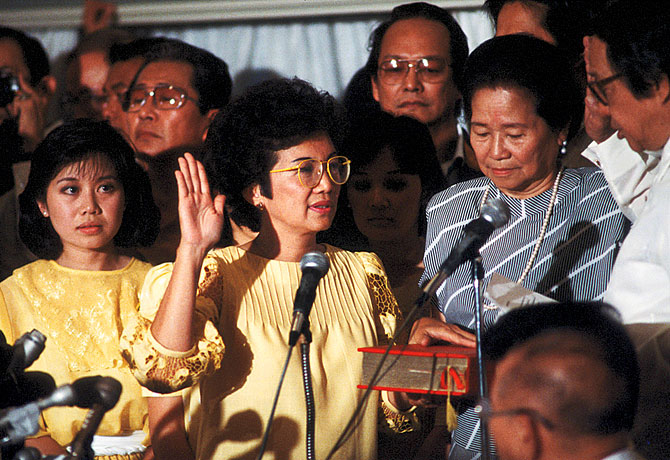|
Philippine Star
''The Philippine Star'' (self-styled ''The Philippine STAR'') is an English-language newspaper in the Philippines and the flagship brand of the Philstar Media Group. First published on July 28, 1986, by veteran journalists Betty Go-Belmonte, Max Soliven and Art Borjal, it is one of several Philippine newspapers founded after the 1986 People Power Revolution. The newspaper is owned and published by Philstar Daily Inc., which also publishes the monthly magazine ''People Asia'' and the Sunday magazines ''Starweek'' and ''Let's Eat''. As part of the Philstar Media Group, its sister publications include business newspaper ''BusinessWorld''; Cebu-based, English-language broadsheet ''The Freeman''; Filipino-language tabloids ''Pilipino Star Ngayon'' and ''Pang-Masa''; Cebuano-language tabloid ''Banat'', online news portals Interaksyon (formerly with News5), LatestChika.com, Philstar Life and Wheels.ph, and TV/digital production unit Philstar TV. In March 2014, the newspaper was a ... [...More Info...] [...Related Items...] OR: [Wikipedia] [Google] [Baidu] |
Newspaper
A newspaper is a periodical publication containing written information about current events and is often typed in black ink with a white or gray background. Newspapers can cover a wide variety of fields such as politics, business, sports and art, and often include materials such as opinion columns, weather forecasts, reviews of local services, obituaries, birth notices, crosswords, editorial cartoons, comic strips, and advice columns. Most newspapers are businesses, and they pay their expenses with a mixture of subscription revenue, newsstand sales, and advertising revenue. The journalism organizations that publish newspapers are themselves often metonymically called newspapers. Newspapers have traditionally been published in print (usually on cheap, low-grade paper called newsprint). However, today most newspapers are also published on websites as online newspapers, and some have even abandoned their print versions entirely. Newspapers developed in the 1 ... [...More Info...] [...Related Items...] OR: [Wikipedia] [Google] [Baidu] |
Television Production
A television show – or simply TV show – is any content produced for viewing on a television set which can be broadcast via over-the-air, satellite, or cable, excluding breaking news, advertisements, or trailers that are typically placed between shows. Television shows are most often scheduled for broadcast well ahead of time and appear on electronic guides or other TV listings, but streaming services often make them available for viewing anytime. The content in a television show can be produced with different methodologies such as taped variety shows emanating from a television studio stage, animation or a variety of film productions ranging from movies to series. Shows not produced on a television studio stage are usually contracted or licensed to be made by appropriate production companies. Television shows can be viewed live (real time), be recorded on home video, a digital video recorder for later viewing, be viewed on demand via a set-top box, or streamed over th ... [...More Info...] [...Related Items...] OR: [Wikipedia] [Google] [Baidu] |
Corazon Aquino
Maria Corazon "Cory" Sumulong Cojuangco-Aquino (; ; January 25, 1933 – August 1, 2009) was a Filipina politician who served as the 11th president of the Philippines from 1986 to 1992. She was the most prominent figure of the 1986 People Power Revolution, which ended the two-decade rule of President Ferdinand Marcos and led to the establishment of the current democratic Fifth Philippine Republic. Corazon Aquino was married to Senator Benigno Aquino Jr., who was one of the most prominent critics of President Marcos. After the assassination of her husband on August 21, 1983, she emerged as leader of the opposition against the president. In late 1985, Marcos called for a snap election, and Aquino ran for president with former Senator Salvador Laurel as her running mate for vice president. After the election held on February 7, 1986, the Batasang Pambansa proclaimed Marcos and his running mate Arturo Tolentino as the winners, which prompted allegations of electoral f ... [...More Info...] [...Related Items...] OR: [Wikipedia] [Google] [Baidu] |
Ferdinand Marcos
Ferdinand Emmanuel Edralin Marcos Sr. ( , , ; September 11, 1917 – September 28, 1989) was a Filipino politician, lawyer, dictator, and kleptocrat who was the 10th president of the Philippines from 1965 to 1986. He ruled under martial law from 1972 until 1981 p. 189. and kept most of his martial law powers until he was deposed in 1986, branding his rule as " constitutional authoritarianism" under his Kilusang Bagong Lipunan (New Society Movement). One of the most controversial leaders of the 20th century, Marcos's rule was infamous for its corruption, extravagance, and brutality. Marcos gained political success by claiming to have been the "most decorated war hero in the Philippines", but many of his claims have been found to be false, with United States Army documents describing his wartime claims as "fraudulent" and "absurd". After World War II, he became a lawyer then served in the Philippine House of Representatives from 1949 to 1959 and the Philippine Senate ... [...More Info...] [...Related Items...] OR: [Wikipedia] [Google] [Baidu] |
Strongman (politics)
A strongman is a type of an authoritarian political leader. Political scientists Brian Lai and Dan Slater identify strongman rule as a form of authoritarian rule characterized by autocratic dictatorships depending on military enforcement, as distinct from three other categories of authoritarian rule, specifically machine (oligarchic party dictatorships); bossism (autocratic party dictatorships); and juntas (oligarchic military dictatorships). A 2014 study published in the '' Annual Review of Political Science'' journal found that strongmen and juntas are both more likely to engage in human rights violations and civil wars than civilian dictatorships. However, military strongmen are more belligerent than military regimes or civilian dictatorships—i.e., they are more likely to initiate interstate armed conflict. It is theorized that this is because strongmen have greater reason to fear assassination, imprisonment, or exile after being removed from power. The rule of military st ... [...More Info...] [...Related Items...] OR: [Wikipedia] [Google] [Baidu] |
Front Page Of The First-ever Issue Of The Philippine STAR
Front may refer to: Arts, entertainment, and media Films * ''The Front'' (1943 film), a 1943 Soviet drama film * ''The Front'', 1976 film Music *The Front (band), an American rock band signed to Columbia Records and active in the 1980s and early 1990s * The Front (Canadian band), a Canadian studio band from the 1980s Periodicals * ''Front'' (magazine), a British men's magazine * '' Front Illustrated Paper'', a publication of the Yugoslav People's Army Television * Front TV, a Toronto broadcast design and branding firm * "The Front" (''The Blacklist''), a 2014 episode of the TV series ''The Blacklist'' * "The Front" (''The Simpsons''), a 1993 episode of the TV series ''The Simpsons'' Military * Front (military), a geographical area where armies are engaged in conflict * Front (military formation), roughly, an army group, especially in eastern Europe Places * Front, California, former name of Brown, California * Front, Piedmont, an Italian municipality * The Front, now pa ... [...More Info...] [...Related Items...] OR: [Wikipedia] [Google] [Baidu] |
Philippine Yearbook
The Philippine Statistics Authority (Filipino: ''Pangasiwaan ng Estadistika ng Pilipinas''), abbreviated as PSA, is the central statistical authority of the Philippine government that ''collects, compiles, analyzes and publishes statistical information on economic, social, demographic, political affairs and general affairs'' of the people of the Philippines and enforces the ''civil registration functions'' in the country. It is an attached agency of the National Economic and Development Authority (NEDA) for purposes of policy coordination. The PSA comprises the PSA Board and offices on sectoral statistics, censuses and technical coordination, civil registration, Philippine registry office, central support and field statistical services. The ''National Statistician'', who is appointed by the President of the Philippines from a list of nominees submitted by a Special Committee and endorsed by the PSA Board Chairperson, is the head of the PSA and has a rank equivalent to an Unders ... [...More Info...] [...Related Items...] OR: [Wikipedia] [Google] [Baidu] |
News5
TV5 News and Information, known on-air as News5 (formerly ABC News and Public Affairs and TV5 News and Public Affairs), is the news and information programming division of the TV5 Network Inc., Philippines. News5 produces its news and information, infotainment, and lately entertainment content for free-to-air analog and digital channels TV5, One Sports and One PH, the flagship radio station Radyo5 owned and affiliate television and radio stations in the Philippines, the satellite channels One News and Colours, internationally through Kapatid Channel, AksyonTV International and media portal News5 ''Always On'' and InterAksyon (which recently absorbed to the PhilStar Group). It is headquartered at the TV5 Media Center, Reliance cor. Sheridan sts., Mandaluyong. Firsts News5 set a number of firsts in news reporting in the country. These include the use of Live-Pack and a virtual news set, the first news FM station ( Radyo5 (Singko) 92.3 News FM) and, prior to December 2013 ... [...More Info...] [...Related Items...] OR: [Wikipedia] [Google] [Baidu] |
Sunday Magazine
A Sunday magazine is a publication inserted into a Sunday newspaper. It also has been known as a Sunday supplement, Sunday newspaper magazine or Sunday magazine section. Traditionally, the articles in these magazines cover a wide range of subjects, and the content is not as current and timely as the rest of the newspaper. United States 19th century With the rise of rotogravure printing in the 19th century, Sunday magazines offered better reproduction of photographs, and their varied contents could include columns, serialized novels, short fiction, illustrations, cartoons, puzzles and assorted entertainment features. Janice Hume, instructor in journalism history at Kansas State University, noted, "The early Sunday magazines were latter 19th-century inventions and really linked to the rise of the department store and wanting to get those ads to women readers." In 1869, the ''San Francisco Chronicle'' published what is regarded as the first Sunday magazine, and the ''Chicago Inter O ... [...More Info...] [...Related Items...] OR: [Wikipedia] [Google] [Baidu] |
1986 People Power Revolution
The People Power Revolution, also known as the EDSA Revolution or the February Revolution, was a series of popular demonstrations in the Philippines, mostly in Metro Manila, from February 22 to 25, 1986. There was a sustained campaign of civil resistance against regime violence and electoral fraud. The nonviolent revolution led to the departure of Ferdinand Marcos, the end of his 20-year dictatorship and the restoration of democracy in the Philippines. It is also referred to as the Yellow Revolution due to the presence of yellow ribbons during demonstrations (in reference to the Tony Orlando and Dawn song "Tie a Yellow Ribbon Round the Ole Oak Tree") as a symbol of protest following the assassination of Filipino senator Benigno "Ninoy" Aquino, Jr. in August 1983 upon his return to the Philippines from exile. It was widely seen as a victory of the people against two decades of presidential rule by President Marcos, and made news headlines as "the revolution that surprised ... [...More Info...] [...Related Items...] OR: [Wikipedia] [Google] [Baidu] |
Max Soliven
Maximo Villaflor Soliven (September 4, 1929 – November 24, 2006) was a Filipino journalist and newspaper publisher. In a career spanning six decades, he founded the ''Philippine Star'' and served as its publisher until his death. Background Soliven was born on September 4, 1929, at the Philippine General Hospital in Manila, Philippines. His father Benito, who died from aftereffects of the Bataan Death March and imprisonment in Capas, Tarlac during World War II, was elected to serve in the pre-war National Assembly. Soliven spent his undergraduate years at the Ateneo de Manila University, where he received the OZANAM award for writing. Soliven received a Master of Arts from Fordham University and Johns Hopkins University's School of Advanced and International Studies. Soliven was proficient in Spanish, as it was one of the languages used by his Ilocano grandparents. Max was the eldest of ten children. His brothers and sisters were Guillermo, Regulo, Manuel, Mercedes, Tere ... [...More Info...] [...Related Items...] OR: [Wikipedia] [Google] [Baidu] |





